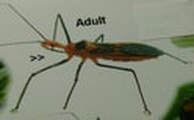 Our gardens are full of beauty. We take great pride in the colorful flowers and lush veggies we so carefully nourish. When we see “critters” chowing down on the fruit of our labor sometimes the first instinct is to run for a chemical that will kill them and do it fast. The problem is that many of the insects and other creatures are an important part of maintaining a balance in our garden. Even though they are sometimes scary looking they can be our partners in pest control. Integrated pest management (IPM) is a cost effective strategy to avoid, prevent, and manage pest damage with minimum harm to human health, the environment, and nontarget organisms. IPM is the pest management strategy implemented by the Texas AgriLife Extension Service. Insecticides should be used only as a last resort as they are harmful to the environment and to us. They don’t discriminate between beautiful butterflies and ugly Leaf-footed bug pests. A strong spray of water from the hose will knock off Aphids and they will not be able to return to the plant. Those nasty Hornworms devouring your precious tomatoes can best be eliminated by putting on your garden gloves and picking them off by hand. Learning how to recognize the beneficials as allies will make your pest control job easier. SOME BENEFICIAL INSECTS HUNTERS These hard working predators include Lacewings, Assassin bugs, Lady beetles (yes Ladybugs are actually beetles), Praying Mantids, Dragonflies, Damselflies, and Spiders. These are just a few of the helpers that control the insect population. The adult Assassin Bug is often found doing his job devouring a broad range of prey including Aphids. He is considered a beneficial in spite of his ominous name. Caution, do not attempt to handle him. He will bite. Assassin Bug picture from Garden Insect Field Guide, Fort Bend County Entomology Group, Master Gardeners POLLINATORS Pollinators include Butterflies, Honeybees, Hoverflies, Wasps and many others. According to the U.S Department of Agriculture, pollinators are responsible for 80% of the worlds flowering plants. Without them humans and wildlife wouldn’t have much to eat or look at. It is estimated pollinators are worth at least 20 billion dollars annually just in the United States. Many species are threatened and crop production is decreasing because of a shortage of pollinators. DECOMPOSERS Decomposers are possibly the most underappreciated of all the beneficials. They live off of the nutrients held in dead organisms. Without the work they do we would be overwhelmed with dead bodies and organic wastes. They include the humble Earthworm as well as Slugs, Snails, Bark Lice, Ox or Elephant beetle to name just a few. Earthworms aerate the soil and enrich it in the form of castings. The castings are a desirable natural fertilizer. People spend money on Earthworm castings but wouldn’t it be much better to welcome them to your garden by maintaining a healthy soil? Given the right environment, in 90 days the total number of earthworms in an area can double. Take a little time in your garden every day, be observant of the activities and the interaction taking place there. Gardening connects us to nature and helps us better understand how nature works. - Kathy Gilmore For questions about IPM (integrated pest management) Master Gardener Volunteers are available to help you find answers to all your basic questions. Email: [email protected] Phone 281-341-7068 Fax 281-633-7070 Texas A&M AgriLife Extension service offers the knowledge and resources of both Texas A&M and Prairie View A&M Universities to educate Texans for self-improvement, individual action and community problem solving. We are a part of a statewide educational network and a member of the Texas A&M University system which values and promotes citizen and community involvement, scientifically-based education, lifelong learning, and volunteerism. Extension is linked in a unique partnership with Fort Bend County Commissioners’ court and the nationwide Cooperative Extension System. This has been a beautiful spring. We had a light winter, plenty of rain and everything in our gardens has a head start. I have tomatoes blooming that were planted last fall. With so many things doing well I suggest branching out with edible landscaping. Why not explore adding edibles to your landscape design? It is a very practical idea. There are many edibles that will integrate beautify with your flowers and shrubs. They not only look good but they taste good. Most of us in Meadows Place have limited space for a large vegetable plot or a formal herb garden. Try a little creativity and have fun with herbs in containers, in beds, and any place your imagination leads you.
Rosemary is one of my favorite herbs. I like to nestle it in the annuals around the front door and approach walkway. The big bonus is the welcoming scent greeting friends and neighbors before I come to the door. There are many varieties. The prostrate variety grows about two feet high and make beautiful borders. It will also cascade nicely from a container. The upright variety grows taller and will mix well with flowers they like full sun and well-drained soil. They are evergreen and will not need to be changed out with the seasonal plants. It is handy to run out and snip a little and it responds well to pruning. Rosemary is one of my favorite culinary tools. I use it with meat and bread. Just for fun try my Rosemary Refrigerator Cookie recipe. It has an intriguing flavor. Rosemary Refrigerator Cookies 1 cup all-purpose flour 1 ¾ t grated lemon zest 1/2cup each butter and sugar 1/8 t salt 1 egg yolk beaten powdered sugar ½ t vanilla 2 T chopped fresh rosemary Combine flour and butter with a pastry blender until mixture resembles coarse meal.Add sugar; mix well. Add egg yolk, vanilla, rosemary, lemon zest and salt. Blend well and shape into oblong rolls. Wrap in wax paper and chill overnight. Slice ¼ inch thick. Sprinkle with powdered sugar. Bake at 350 degrees 10 minutes. Makes 5 dozen cookies. Mint is another herb that has many varieties. It tends to spread in the garden and can take over if it is happy. I like to tame it by keeping several specimens in hanging baskets on my patio. It drapes well, can’t become unruly and it likes the relative shade there. I like to use it to garnish. And it is fun to make a simple syrup with mint to add to beverages like tea and Mint Julips. Lemon grass is another multipurpose herb. It contains citronella. The rustle of slender grasses is soothing around a patio and the citronella provides protection from pesky mosquitos. Many Asian dishes call for Lemon Grass. Actually use it in any dish that calls for lemon flavor. It is best to harvest the tender stalks from the center of the plant. Basil loves warm weather. It is an annual so you will need to plant from seeds or if you waited till now it is readily available at the nurseries. Again there are many varieties. The most traditional is Sweet Basil which grows to about 2 feet in height. It will keep you busy trimming back to keep it from blooming. When it is happy you will have a challenge trying to use it all. That’s when I like to make pesto and freeze it for the cold months. Then let it bloom. The pretty white flowers will enhance your borders and the butterflies will visit often. Thai basil is used in many dishes from Thailand and valued for its unique flavor. It will produce purple flowers. Caprese salad with Basil pesto and Balsamic vinegar and home grown tomatoes. Slice tomatoes, top with fresh Mozzarella cheese, garnish with fresh Basil leaves and pesto, drizzle Balsamic vinegar. My best resource for this article came from an excellent book by Cheryl Beesley. The title is Landscaping with Edible Plants in Texas, Texas A&M University Press. I highly recommend it for your garden library. The information on how to integrate your landscape with edibles is comprehensive. It will give you all the how to plant, where to plant, and what to plant; in addition to practical advice on layout, soil preparation, fertilization and much more. - Kathy Gilmore For questions about your home landscape and plants Master Gardener Volunteers are available to help you find answers to all your basic gardening questions. Email: [email protected] Phone 281-633-7070 Fax 281-633-7070 Texas A & M AgriLife Extension service offers the knowledge and resources of both Texas A & M and Prairie View A & M Universities to educate Texans for self -improvement, individual action and community problem solving. We are a part of a statewide educational network and a member of the Texas A&M University System which values and promotes citizen and community involvement, scientifically-based education, lifelong learning, and volunteerism. Extension is linked in a unique partnership with Fort Bend County Commissioners’ court and the nationwide Cooperative Extension System. |
Proudly powered by Weebly
